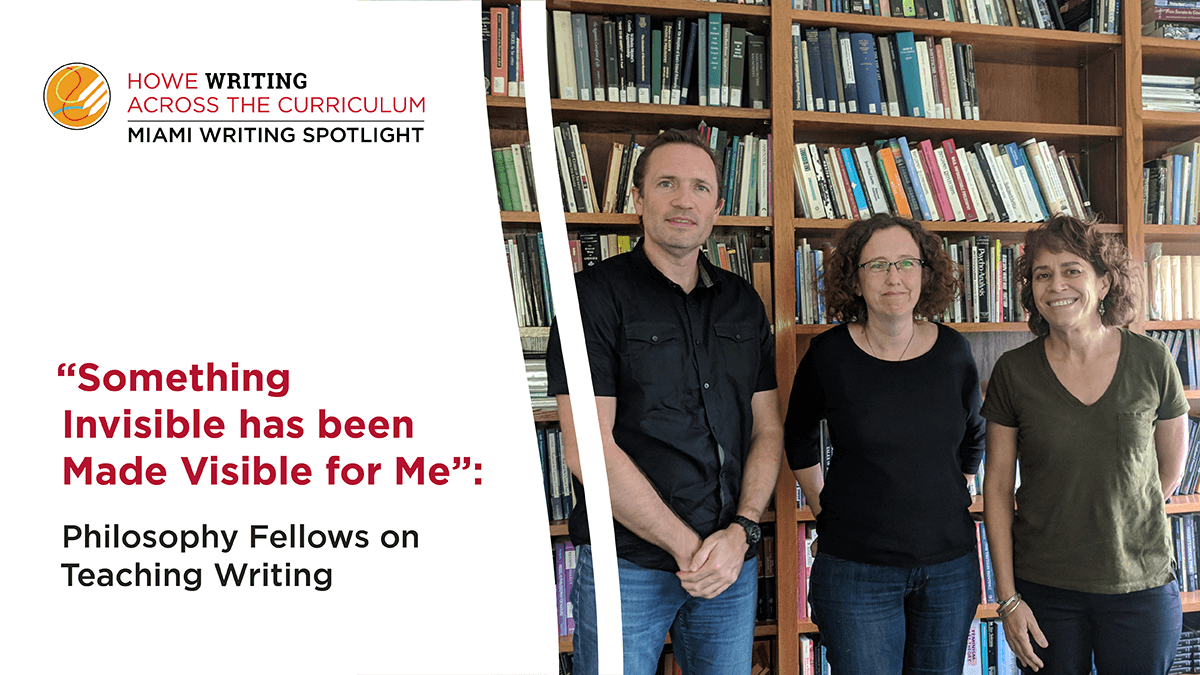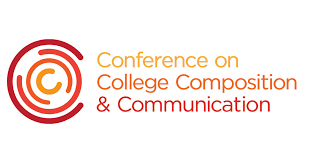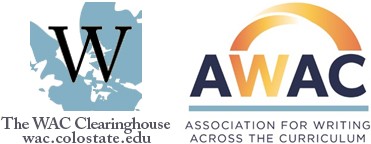"Something Invisible Has Been Made Visible For Me": Philosophy Fellows on Teaching Writing
Making Their Values Visible
Miller says she found the idea of threshold concepts “really helpful.” She continues, “I think that those who have already gone through the threshold. . . just kind of already know how to operate within the discipline. Now I feel like...something invisible has been made visible for me and now I can make it visible for my students as well.”
In order to make their threshold concepts visible for students, Fennen, Miller, and Pohlhaus rewrote and annotated a strong student paper to be part of a writing guide for philosophy students.
“It’s telling that we probably spent many hours. . probably two or three hours. . .and we didn’t even get through the entire thing,” Fennen says of the experience, adding that it was “helpful” for him to consider “how much work the students really need to put into a paper.”
“It really took a while for us. . .to hammer this thing out in a way that would clearly demonstrate” the concepts and values the team generated during an earlier portion of the workshop, Pohlhaus says.
Small Changes in Teaching Practice
Now that the Fall 2018 semester is underway, the team took the opportunity to reflect on how that summer experience has been taken up in their teaching this semester. At first, no one was certain they had changed their teaching, at least not in radical ways. Instead, the knowledge made visible during the workshop has helped them tweak teaching activities they started doing before the workshop.
Miller explains that she introduced the difference between empirical and conceptual claims on the first day of class as they began talking about Plato. “Usually when I present it,” Miller says, “I talk about ‘the realm of becoming’ and the ‘realm of being’ in Plato and that, to [first year students], just sounds very foreign.”
“I spent a lot of time on” the empirical/conceptual distinction Miller says, “and now having set it up in one day, every single class. . .we go back to it.”
“And it’s not me saying, ‘Now remember the distinction,” Miller continues, “it’s one of the students saying ‘well this is a conceptual claim.’”
Similarly, Pohlhaus talks about drawing attention to the thinking process that goes into reading philosophical texts. One process she uses is “standardizing arguments that are in a text and mapping them out on the board.”
In this process, she states premises in the work and tells students, “Notice I’m not just making a list of things that Socrates said; I’m putting them in an order so that you can see the relationship between the ideas and how they work together.”
This activity is useful for “looking at how the ideas relate to one another,” Pohlhaus says, especially because ideas that need to be connected may appear quite far apart in the text itself.
Imagining New Ways to Teach Philosophy Writing
One of the motivations for participating in the summer program was that Fennen, Miller, and Pohlhaus all take turns teaching the philosophy department’s advanced writing course. They want to help their students because writing in philosophy can look very different than other writing students have done.
“It’s frustrating that there are no books that teaching writing philosophy in the way that we would like to teach [it],” Miller says.
The problem? The philosophy writing textbooks they’ve seen too often emphasize “pick a side” and “debate” style approaches that Pohlhaus calls a “familiar thing” that can “prevent [students] from actually going through the threshold” to think and act like philosophers. Without a textbook, these professors have been looking for materials that help teach the kinds of writing they actually do as philosophers in ways that are appropriate for the students they teach.
Fennen says having lots of examples of what philosophy writing looks like to discuss is helpful, especially because students often come to their classes with experience writing successful essays but without understanding what exactly is required of a philosophical argument. It’s hard, though, to come up with enough examples on one’s own.
In the faculty fellows program, the team thought about the writing that is typical of their discipline and were also exposed to the kinds of writing students are asked to do in other courses. This helped them see similarities and differences that they can now use in their own teaching.
For example, Miller compares the process of writing a five-paragraph essay, like students do in high school, to making a necklace: “You’re putting five beads on, but you could also put six beads or seven beads. It doesn’t matter.”
The philosophy essay is different, though. Miller says the philosophy essay is an argument and “has to be put together in such a way that. . .you can’t just take one of the beads out.”
“You can’t just rearrange,” Pohlhaus continues, “it had to be in that order.” Her “standardizing an argument” activity helps students see that order in the texts they read.
Through collaboration and discussion of examples, Fennen, Miller, and Pohlhaus think students will be able to see differences for themselves, something Fennen has seen in his own classes.
Fennen has shared paragraphs with students for discussion after talking about what good writing looks like. “Inevitably,” he says, “you will have six, seven students raise their hand, give feedback on the paragraph, and they will pick out all the right things with respect to what's problematic.” This can especially help writers see where what was written can be taken in multiple ways.
In this respect, Pohlhaus sees philosophy writing as like a puzzle. Collaboration can help writers find the solution by pointing out what they haven’t already stated.
Pohlhaus said it really helps to have someone show you that there’s one jigsaw piece “you have in your hand still, and you need to get it on the page.”
Howe Writing Across the Curriculum Programs
The mission of the Howe Writing Across the Curriculum Programs is to ensure that all Miami faculty and graduate teaching assistants can effectively include writing as a means to support learning in their courses and programs.


